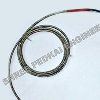






Washer Type Thermocouples
Get Price Quote
50 Piece (MOQ)
Washer Type Thermocouples Are used to measure the temperature of at surface like PackagingMachines, Rubber Moulding Machines, Hot Plates Platons etc. These Thermocouples are custom designed therefore the length & type ofthermocouple is to be speci ed alongwith the O.D., I.D. and thickness of thewasher.

head type thermocouple
Get Price Quote
100 Piece (MOQ)
Best Deals from Thermocouple

Thermocouple Cuppy
70 - 90 Per Piece
1 Piece (MOQ)
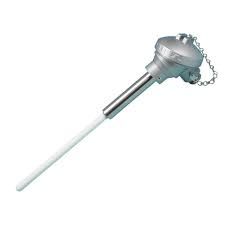
Thermocouples
Get Price Quote
We make available a wide range of Thermocouples having numerous industrial applications. We offer best quality Head Type Thermocouple and RTD Thermocouple that are in accordance with highest quality standards. These Thermocouples have temperature sensor based wire assembly that is used with a control device. Thermocouples that we provide, offer hassle free & long working life. Why Our Thermocouples? Long functioning life In compliance with international standards Heat resistant Reliable

Immersion Pyrometer
25,750 - 32,930 Per Piece
10 Piece (MOQ)
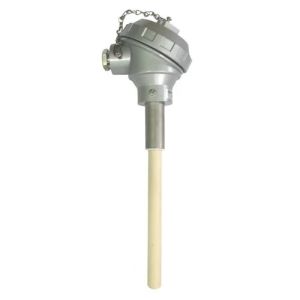
R Type Furnace Temperature Thermocouple
5,000 Per Piece
1 Piece (MOQ)

Thermocouples
350 - 4,500 Per Piece
10 Piece(s) (MOQ)
The assistance of our experienced quality analyst guarantees us that we make use of quality raw materials for the production of our entire range. Therefore, our buyers enjoy flawless products. We have established a state-of-the-art warehouse facility and equipped it with the latest inventory control system. Thus, we can take care of seasonal supply, wholesale supply, and quick supply among others.
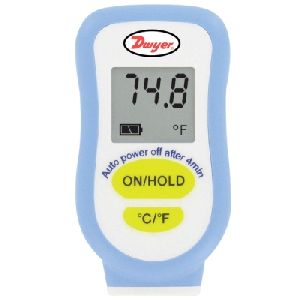
DKT-1 Pocket-Size Thermocouple Thermometer
Get Price Quote
DKT-1 Pocket-Size Thermocouple Thermometer Model DKT-1 Pocket-Size Thermocouple Thermometer Selectable °F/°C, Accepts Mini-Plug Input No longer available, please see Series TP2 as a suggested replacement. The Model DKT-1 Pocket-Size Thermocouple Thermometer accurately monitors temperatures in a variety of applications. The wide measurement range and selectable engineering units allow users to easily view readings in either °F or °C. The automatic power down feature conserves battery life. This compact thermometer accepts any K-type thermocouple sensors (sold separately) with mini-plug connectors. Specifications Range:-83.2 to 1999°F (-64 to 1400°C). Ambient Operating Temperature:32 to 122°F (0 to 50°C). Accuracy:±1% of Reading or 1.8°F (1.0°C). Probe Connection:K type mini-jack. Resolution:0.1°F/°C. Power Requirements:3 V CR2032 lithium metal battery, installed functional, user replaceable. Battery Life:Estimated 100 hours continuous use. Weight:1.42 oz (40.15g). Agency Approvals:CE.

RTD Thermocouples
Get Price Quote
We specialize in manufacturing, exporting & supplying of RTD Thermocouples from Delhi, India. The range of RTD Thermocouples we offer has garnered appreciation in both national and international markets for their innovative design, hassle free performance and requirement of less maintenance. To cater to the bulk requirement of buyers, we stock the RTD Thermocouples in our spacious warehouse, ready for dispatch at a moment’s notice. The concept of temperature : From a physical point of view, heat is a measure of the energy contained in a body due to the irregular motion of its molecules or atoms. Just as a tennis ball possesses more energy with increasing speed, so the internal energy of a body or gas increases with increasing temperature. Temperature is a variable which together with other parameters such as mass and specific heat describes the energy content of a body. The basic measure of temperature is the degree Kelvin. At 0?K(elvin) the molecules of every body are at rest and it no longer has any thermal energy. There is therefore no possibility of negative temperatures since there cannot be a state of lower energy. In every-day use it is general practice to use the Celsius scale (previously Centigrade). Its zero is placed at the solidification point of water since this point is very simple to reproduce in practice. Now 0?C is by no means the lowest possible temperature as everyone knows from experience. By extending the Celsius scale to the lowest possible temperature where all molecular movement ceases we reach a temperature of -273.15 degrees. Man has the ability to measure temperatures through his senses within a limited range. However, he is incapable of accurate reproduction of quantitative measurements. The first forms of quantitative temperature measurement were developed at the beginning of the 17th century in Florence and depended on the expansion of alcohol. The scaling was based on the maximum summer and winter temperatures. A hundred years later the Swedish astronomer Celsius replaced this by a scale based on the melting and boiling points of water. This offered the opportunity for a thermometer to be scaled at any time and reproduce readings at a later time. Measuring temperature electrically : The measurement of temperature is important in many applications, such as, building control, food processing and the manufacture of steel and petrochemicals. These very different applications require temperature sensors of different physical construction and often different technology. In industrial and commercial applications the measurement point is frequently far away from the indication or control point. Often there is a requirement for further processing of the measurement in controllers, recorders or computers. Such applications are unsuitable for directindicating thermometers as we know them from every-day use but require devices which convert temperature into another form, an electrical signal. To provide this remote electrical signal it is common practice to employ RTD?s. thermistors and thermocouples. RTD?s : RTD's employ the property that the electrical resistance of metals varies with temperature. They are positive temperature coefficient (PTC) sensors whose resistance increases with temperature. The main metals in use are platinum and nickel. The most widely used sensor is the 100 ohm or 1000 ohm RTD or platinum resistance thermometer. RTD?s are the most accurate sensors for industrial applications and also offer the best long-term stability. A representative value for the accuracy of a platinum resistance is +0.5 percent of the measured temperature. After one year there may be a shift of +0.05?C through aging. Platinum resistance thermometers can cover temperature ranges from -200 to 800?oC. The variation of resistance with temperature The electrical conductivity of a metal depends on the mobility of the conduction electrons. If a voltage is applied to the ends of a metal wire the electrons move to the positive pole. Faults in the crystal lattice interfere with this movement. They include foreign or missing lattice atoms, grain boundaries, and atoms on interlattice positions. Since these fault positions are independent of temperature they produce a constant resistance. With rising temperature the atoms of the metal lattice exhibit increasing oscillations about their rest positions and thereby impede the movement of the conduction electrons. Since this oscillation increases linearly with temperature, the resistance increase caused by it depends as a first approximation directly on the temperature. In industrial measurement the resistance material platinum has found general acceptance. Its advantages include chemical stability, comparatively easy fabrication (especially for wire manufacture), the possibility of obtaining it in highly pure form, and electrical properties which can be reproduced. These characteristics have made the platinum resistance sensor the mostuniversally interchangeable temperature sensor. Thermistors : Thermistors are made from certain metal oxides whose resistance decreases with increasing temperature. Because the resistance characteristic falls off with increasing temperature they are called negative temperature coefficient (NTC) sensors. Due to the nature of the basic process the number of conducting electrons increases exponentially with temperature; the characteristic therefore exhibits a strongly rising form. This pronounced non-linearity is a disadvantage of NTC resistors and limits their useful temperature span to about 100oC. They can of course be linearised by an automation computer. However, accuracy and linearity generally do not meet the requirements over larger measurement spans.Their drift under alternating temperatures is also larger than for RTD?s. Their field of use is limited to monitoring and indicating applications where the temperatures do not exceed 200OC. In such simple applications they are actually preferable to more expensive thermocouples and RTD?s in view of their low cost and the comparatively simple electronic circuitry required. In addition they can be produced in very small designs with a fast response and low thermal mass. temperature. In industrial measurement the resistance material platinum has found general acceptance. Its advantages include chemical stability, comparatively easy fabrication (especially for wire manufacture), the possibility of obtaining it in highly pure form, and electrical properties which can be reproduced. These characteristics have made the platinum resistance sensor the most universally interchangeable temperature sensor. Thermocouples : Thermocouples are based on the effect that the junction between two different metals produces a voltage which increases with temperature. Compared with resistance thermometers they offer the clear advantage of a higher upper temperature limit, up to several thousand degrees Celsius. Their long-term stability is somewhat worse (a few degrees after one year), the measuring accuracy is slightly poorer (on the average +0.75% of the measurement range). They are frequently used in ovens, furnaces, flue gas measurements and other areas with temperatures above about 250oC. The thermoelectric effect : When two metals are connected together, a thermoelectric voltage is produced due to the different binding energies of the electrons to the metal ions. This voltage depends on the metals themselves, and in addition on the temperature. In order for this thermal voltage to produce a flow of current the two metals must of course be also connected together at the other end so that a closed circuit is formed. In this way a thermal voltage is produced at the second junction. The thermoelectric effect was discovered in 1822 by Seebeck, and as early as 1828 Becquerel recommended the use of a platinum-palladium thermocouple for temperature measurement. If there is the same temperature at the two junctions there is no flow of current since the partial voltages produced at the two points cancel each other. With different temperatures at the junctions the voltages generated are different and a current flows. A thermocouple can thus only measure temperature differences. The measurement point is the junction which is exposed to the measured temperature. Thereference junction is the junction at the known temperature. Since the known temperature isusually lower than the measured temperature, the reference junction is generally called the coldjunction. In order to calculate the actual temperature at the measurement point the coldjunction temperature must be known. Older instruments used a thermostatically controlled junction box to control this cold junction temperature at a know value such as 50C. Modern instruments use a thin film RTD at the cold junction to determine its temperature and calculate the measurement point temperature. The voltage produced by the thermoelectric effect is very small and amounts to only a few microvolts per degree Celsius. Thermocouples are therefore not generally used within the range -30 to +50?C since the difference from the reference junction temperature is too small here to produce an interference-free signal. RTD Wiring : In the resistance thermometer the electrical resistance varies with temperature. For evaluating the output signal a constant current is passed through it and the voltage drop across it is measured. For this voltage drop follows Ohm's Law, V=IR. The measuring current should be selected to be as small as possible in order to avoid heating of the sensor. It can be taken that a measuring current of 1 mA does not introduce any appreciable errors. This current produces a voltage drop of 0.1 V in a Pt 100 at 0?C. This signal voltage must now be transmitted through the connecting cables to the indicating or evaluation point with a minimum of alteration. There are four different types of connecting circuit : 2-wire circuit : The connection between the thermometer and the evaluation electronics is made with a 2 conductor cable. Like any other electrical conductor this cable has an electrical resistance which is placed in series with the resistance thermometer. The two resistances are therefore added together which is interpreted by the electronics as an increased temperature. With longer distances the line resistance may amount to a few Ohms and produces an appreciable shift in the measured value. 2-wire transmitters : The problems of the 2-wire circuit as described above can be avoided without the use of a multiconductor cable by employing a 2-wire transmitter. The transmitter converts the sensor signal into a normalized current signal of 4 - 20 mA which is proportional to temperature. The supply to the transmitter is also run through the same two connections, using a base current of 4 mA. The 2-wire transmitter offers the additional advantage that the amplification of the signal greatly reduces the effects of external interference. There are two arrangements for positioning the transmitter. Since the distance for the unamplified signal should be kept as short as possible the amplifier can be mounted directly on the thermometer inside its terminal head. This optimum solution is some times impossible for constructional reasons or the consideration that the transmitter may be difficult to reach in case of a fault. In such situations a rail mount transmitter is mounted inside the control cabinet. The advantage of improved access is bought at the expense of the longer distance over which the unamplified signal has to travel. Thermistor Wiring : The resistance of thermistors is is normally several orders of magnitude greater than any lead resistance. The lead resistance therefore, has a negligible effect on the temperature reading and thermistors are almost always connected in a 2-wire configuration. Thermocouple Wiring : Unlike RTD?s and thermistors thermocouples have plus and minus legs so polarity must be observed. They can be directly connected to a local 2-wire transmitter and copper leads can be run back to the receiving instrument. If the receiving instrument is capable of accepting thermocouple inputs directly you must use the same thermocouple wire or thermocouple extension wire all the way back to the receiving instrument. Choosing the right sensor for building automation : Platinum RTD?s are the most accurate and stable sensors over a long time period. Their cost to the trade is typically about Cdn$5 more per point than thermistors. Some automation panels do not accept RTD?s directly and with these panels they must be used with temperature transmitters which add about Cdn$50. Thermistors are not quite as accurate or stable as RTD?s but they are easier to wire, cost slightly less and almost all automation panels accept them directly. Note though that thermistors are available in many different base resistances and with many different curves. You must specify the right thermistor for the panel you will use. Thermocouples are widely used in industrial applications because they work reliably at very high temperatures and are less expensive than RTD?s. In building automation they are rarely required because most temperatures measured are less than 100C. They are, however, used frequently in flue gas measurements in conjunction with 2-wire transmitters. Consultants on some jobs specify platinum RTD?s because of their improved accuracy and long term stability. If the automation panel you are using does not take RTD?s directly use them in conjunction with a 2-wire transmitter to meet the specification.

K Type Thermocouple Sensor
125 Per piece
24 Meter (MOQ)
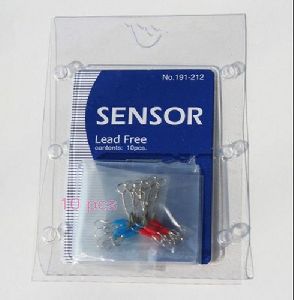
Thermocouple Temperature Meter
750 Per Pack
100 Pack(s) (MOQ)

Thermocouple thermometer
Get Price Quote
1 Piece (MOQ)

Thermocouple Heater
799 Per piece
10 pieces (MOQ)
J type thermocouple are most commonly used and its A Cheapest thermocouple among all..... suitable for plastic machinery and general purpose application, these pencil thermocouple sensor are available in all type ( J, K, T, E, N, rtd ) with an industry standard on slot adjustable bayonet cap fitting, the fitting can be fine tuned for positioning on site and its suitable where several applicarion in your plant require individual positioning of the assembly. probe length is 150 mm and dia is 6 mm..... Features Tempeature range is 0 to 500 C, probe dia 6 mm and probe length 150 mm. Cable length is 1 mtr to 10 mtr where inner insulation is fiberglass and outer insulation is stainless steel braided wire for high Tempeature. Its widley, food, chemical, pharma and industrial machinery.......If you need other sizes, you can email us to customize, we will update new product for you.
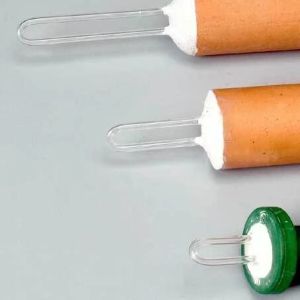
temperature tips
Get Price Quote
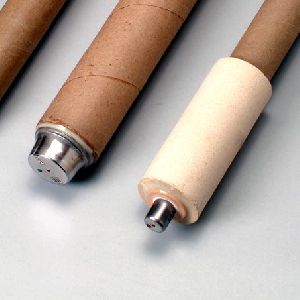
Thermocouple Tips
Get Price Quote
Thermocouple tips are used for measurement of molten metal temperatures. We manufacture a variety of models for various requirements, viz. MK III, MKVI, MK VII (5 Types) and ceramic body – male connector type. All these models use different connectors (either Female Type or Male-Female Type) and use paper tubes with different Inner diameters. The Thermocouple tips are available in a range of calibrations. The junctions are: Platinum & Platinum 10% Rhodium (Type S) Platinum & Platinum 13% Rhodium (Type R) Platinum 6% Rhodium & Platinum 30% Rhodium (Type B) The Platinum & Platinum alloy wires are housed in a quartz tube capable of withstanding temperatures of up to 2000° C. Thermocouple cartridges are fitted on to spiral wound paper tubes. Paper tube lengths up to 1800 mm as per customers requirements can be supplied. Paper tubes have wall thickness of 6.5 + 0.25 mm – 0.50 mm. Optional Antisplash ceramic coating on front portion of the paper tube can be supplied as per customer's specifications.

Thermocouple
Get Price Quote
Available types: T, J, K, E, R, S, B Simplex Duplex Triplex Available types: PT100, PT46 Simplex Duplex Connection: 2, 3 or 4 wires

Digital Thermocouple Calibrator
Get Price Quote
Thermocouples
Get Price Quote
We are actively engaged in manufacturing, exporting and supplying of Thermocouples from Delhi, India. Thermocouples are designed and developed by our skilled personnel at our high-tech production unit. Thermocouples, that we offer, are used to convert heat energy into electricity and vice versa. Being a customer-centric company, we can also provide customized solutions for Thermocouples and that too at budget friendly rates. We assure timely deliveries. Type of Thermocouples : A Thermocouples is a Sensor Used to Measure Temperature. Thermocouples Consist of Two Wire Legs Made from Different Metals. & Different Fitting. There are Many Type of Thermocouples : and Its Used in Many Industrial, Scientific, and Oem Applications.we have all Kind of Thermocouples and Its Accessories Available for You. Type of : 'J', 'K', 'T', 'N,' 'E', 'B', 'R', 'S' etc.Thermocouples and Its Accessories Available For You At Lowest Price.
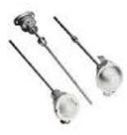
Thermocouples
Get Price Quote
Our Thermocouples are characterized by precision and durability. They are finished precisely whereby painstaking attention is spared on the details. This makes our offering flawless in all respects. We are reckoned among the acknowledged Manufacturers and Suppliers of Thermocouples in Delhi. Our manufacturing techniques are abided by set norms, taking care of not getting deviated from the quality parameters. And the demand for customization is well met by us. Count on us!Details : Type : J , k , pt-100(rtd) r, s , t Hi accuracy of temperature measurement. Excellent stability and reproducibility.. Designed for fast response. Simplex , duplex , and triplex element assembly. Metallic protective sheath Suitable use for up to 1200 c. Ceramic protective sheath. Suitable beyond - 1200 'c up to 1800 'c. Heavy duty industrial metal sheathed rtd ,s Hand held rtd probes. Size : Multi type different size.

Radix Thermocouple Portion Tubes
Get Price Quote
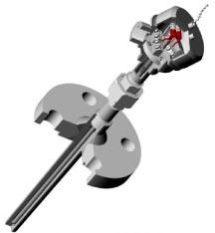
thermocouple assembly
Get Price Quote
Being a quality centric company, it is our prime focus to provide quality assured product. We are a reliable Manufacturer and Supplier of Thermocouple Assembly from Delhi, India. The Thermocouple Assembly that we deal in is made-up by employing qualitative metal that is durable as well as non-corrosive. Here, with us, buyers can place even bulk orders that are sure going to be delivered within the promised timeframe.
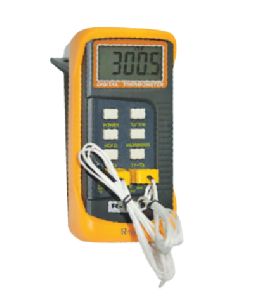
Thermocouple thermometer
Get Price Quote
Features : Micro Controller Software Controlled, Accurate and Reliable, no drift °Cr F/K Switchable Data Hold MAX/MIN/AVG Selection Button Quick Sampling Speed and Automatic Temperature Compensation Low Battery Indication and Auto Power Shut OFF Function Integrated Rear Bracket, and with Shockproof Protective Sleeve T1 and T2 Double-end Input : T1-T2, Differential Temperature Measurement
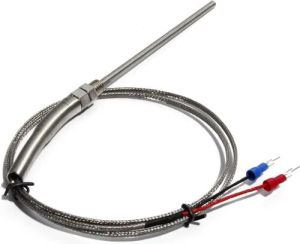
K Type Thermocouple
400 Per Piece

electric thermocouple
Get Price Quote
6 Piece (MOQ)
Hunting for Thermocouple Manufacturers In Delhi? Sunrise Products is your one-stop to reach. We have the best quality and diverse range to offer. Our offered thermocouple is the most used temperature sensor, which is mainly used for the purpose of measuring the temperature process. It consists of two metal wires, which are connected with each other to ensure proper measurement of the temperatures. It also has a screen that demonstrates the reading and controls the same. These Thermo Couples are known for their durability, reliability and dependable performance. Electric Thermocouple Sensor is very much useful and helps to sense the temperature, which makes it easier for the user to predict whether it is ideal for your application or not. Their customized designs are easily accessible, as we have a team of trained and expert people to meet different requirements of the customers. Being the most dependable Temperature Thermocouple Exporters and Suppliers in India, we quote you a reasonable possible price and serve full assistance even after the sales take place. We are only a few steps away to answer any of your queries that you want us to answer before investing in them. Call us or drop your email directly into the inbox now.

Scope Protection Tube
1,800 Per Piece
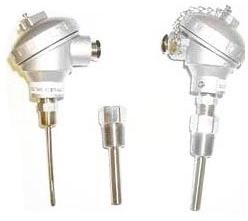
RTD Thermocouples
Get Price Quote
Procured from reputed Vendors and Traders in the domain, the RTD Thermocouples, which we offer, are properly calibrated, have long life and are light in weight. These RTD Thermocouples are manufactured using quality thermo wells of varied materials to suit the specific applications. These RTD Thermocouples are available in various sizes and dimensions, catering to the diverse needs of the customers. Attributes Of RTD Thermocouples RTDs may be purchased with 2, 3, or 4 lead wires.Extending from the sensor for determining the number of wires, consideration of the following is Important :Nominal sensor range and resistanceCorrosion potential - environmentalConditionsReceiving device locationRequired accuracyStability Specifications Of RTD Thermocouples RTD type thermocoupleIndustrial thermocoupleJ, S, K, PT100 typeWater-proofexplosion-proof
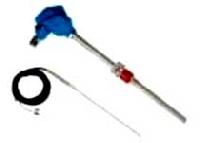
Thermocouple
Get Price Quote
We are identified as one of prominent Thermocouple Manufacturers and Suppliers in India. Our Thermocouple Thermometers are tested on the various parameters of quality and other related norms before being dispatched in the market. Furthermore, we ensure careful packaging of Thermocouple that ensures its safety during transit.
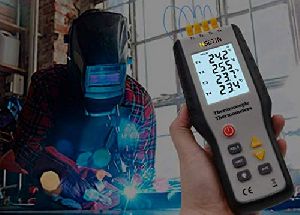
Thermocouple thermometer
5,800 Per Piece
1 Piece (MOQ)
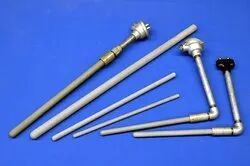
Molten Aluminium Thermocouple
12,000 Per Piece
2 Piece (MOQ)
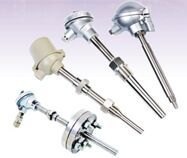
Thermocouples
Get Price Quote
Our Mineral Insulated Thermocouple Assemblies consist of two,four or six thermocouple wires embedded in compact Mgo - mineral insulation, enclosed in a metallic tube The assembly is compact ,flexible enough to route, has a high insuation resistance and high thermal conductivity. Mineral insulated thermocouple assemblies are robust in construction and offer good mechanical strength. Advantages: Faster response Longer length can be offered Pliable and easily routed available in SS316, SS310, Inconel -600,Incoloy -800,SS446 sheath materials